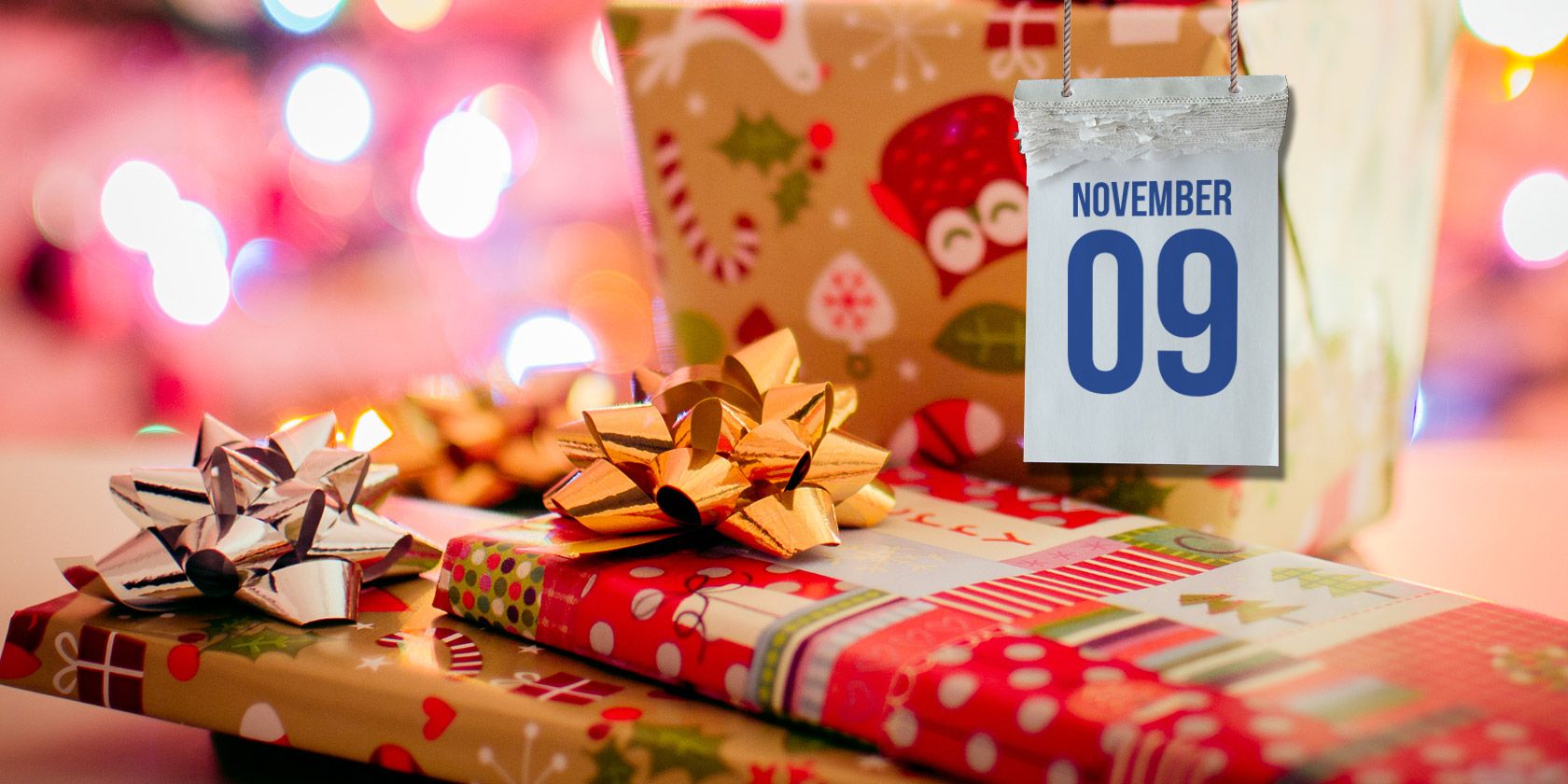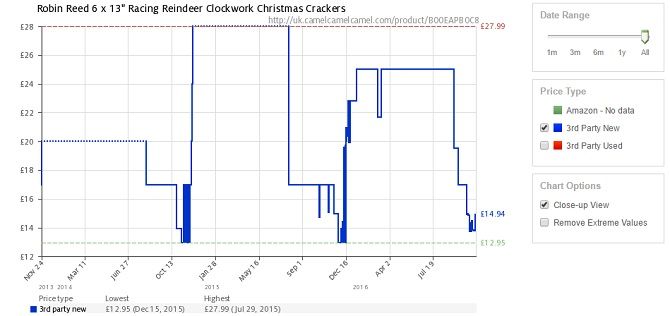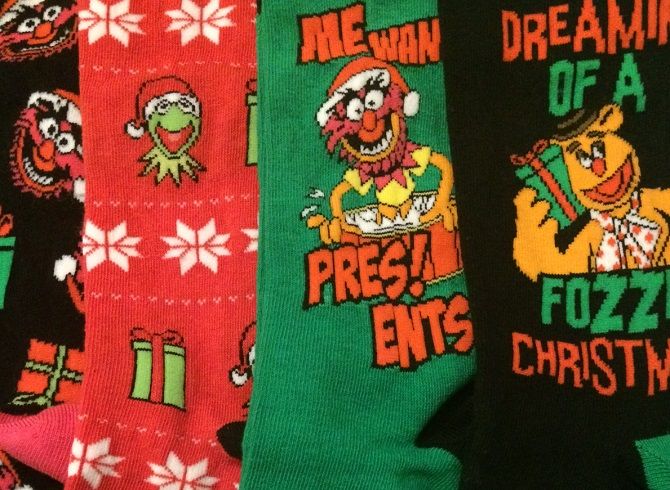I'm going to say the C-word. It's a word that results in joy and repulsion in equal measure. Here goes.
Christmas.
Like it or not, it's nearly here. Some people leave festive shopping until the week before, or even the day before Christmas, but in an extensive study, scientists concluded these people are clinically insane. Honest.
Much of the animosity towards the holiday season stems from expense. After all, there's no point paying for Christmas into the next year, literally or figuratively. Fortunately, this can be easily remedied by shopping early.
Note Down Everything You Buy
I just bought a lovely new Christmas book. It's a bright red Toy Story Moleskine, and it's gorgeous.
I've had a Christmas book since I was 11, and I get many benefits from it. At the front, I have a list of people I need to buy for -- family, friends, colleagues -- and I leave a gap between each name. I write down everybody's presents, and mark them off as I pack them. At the back, I make a more extensive list of people to send Christmas cards to.
This way, I keep track of what I've bought already, and the number of gaps tells me my progress. Aside from having a notepad of memories, I can also see roughly how much I've spent on people in the past and factor that in for the coming festivities. That'll make budgeting easier next year, too.
It's far from rocket science, but it's well worth doing. By December, you may have forgotten what you picked up in October. Amid a panicked mess of postage dates, wrapping, and planning Christmas events, this notebook is an oasis of organization, and that's something we all need.
The worry, however, is that you'll lose the book. If you prefer to keep things digital, you could make similar notes on a private blog or even a localized or cloud-based notebook app.
Ignore or Budget for Black Friday
Black Friday's a relatively new phenomenon: what's supposed to be a time to treat others has turned into a spending spree for those who want to buy something solely for themselves. Come on: how many of us buy other people TVs, laptops, or smartphones for Christmas?! Family, maybe, but rarely friends!
You've got two main options to deal with Black Friday. The first is to ignore it completely. After all, if you've done most of your holiday shopping early, there's little point (unless you are shopping for yourself). It's not that difficult to stop visiting brick-and-mortar stores for 24 hours, but it's harder when faced with discounts from Amazon and company.
If that's too "scorched Earth" for you, browse to your heart's content... but with a strict budget. Set your Christmas notepad open in front of you so you know who you still need presents for, and write down how much you intend to spend on each. Do not cross that line.
Don't get caught up in the adrenaline rush of bargains: it's bad for your wallet, and it's bad for your security.
Buy Non-Perishable Food in November
Christmas shopping isn't all about presents. You also have to factor in the indulgences of the day: food and drink.
That's why the malls are busy on December 24: people forget that stores are generally only shut for one day and think they need to buy enough food to last a month. It's a futile exercise. Sure, get milk, bread, and any other perishables a couple of days before the main event, but nobody needs to rush out for cleaning supplies, beverages, or snacks on Christmas Eve.
Buy non-perishables as early as possible. Discounts on festive favorites typically begin in October, but they kick into another gear once Halloween is out of the way. Keep an eye out, because bargains will be rolled out on items throughout November.
Just make sure you check expiration dates!
If you don't fancy hitting the normal shops this early, however, you could try Amazon Pantry, as long as you're a Prime member.
Practice Basic Saving Techniques
While we're on the subject of Amazon, the time of year doesn't matter: compare prices on whatever you're buying.
Everyone automatically goes to Amazon, and in a lot of cases, the retail giant offers the best prices. Nonetheless, you won't lose anything by checking out alternatives. Sometimes that means looking at third-party sellers, and that's well worth it -- as long as you know your rights and their return policies. Similarly, if you go straight to the dealer on eBay, for instance, you may save a few dollars.
Whenever I buy from Amazon, I always check out CamelCamelCamel, which tracks the cost of items so you can see whether they're unusually high or low. You might miss out if you don't snipe products at just the right moment, but you could save a huge amount of cash if you buy at the right time. Let's take LEGO for example: their advent calendars are always a treat, but come November, they're either sold out or command too much money.
So buy them in September. Or earlier, if the price is right!
Before you buy anything, no matter where, search for savings codes -- someone might've spotted a bargain you missed. In rarer cases, online stores (including Apple) offer discounts if you leave items in your shopping car but don't check out. They figure you're having second thoughts and that offering money will push you into a sale.
Set Alerts for Sales
If you don't fancy frequent visits to price tracking websites, alerts are available for Amazon and everywhere else.
For Amazon, check out OnlinePriceAlert, which emails you when a specific product hits a target price within 30 days. Since its inception in 2008, the service has saved customers over $1,000,000. You could use this in conjunction with CamelCamelCamel to determine a reasonable target value.
It's fairly easy to find bargains on other sites too. First, subscribe to sites' newsletters: they always inform regular customers when a sale is imminent. Zavvi, for instance, sends emails most days, either with savings or steelbook releases.
You can also use Google Alerts to find good deals and coupon codes. There's a real art to perfecting these alerts, but it's definitely worth it. Just remember to check your email regularly!
Start on Boxing Day
I'm serious! This obviously won't help you if you're scrambling to finish up your shopping in November, but come December next year, you'll be pleased you started shopping early.
January sales commence as soon as the shops reopen after Christmas, so take advantage of them -- not just for yourself, but for others. Look for unusual things so your recipient is less likely to pick up the same item during the following months. Try stores you know they don't frequent or that are away from their normal routes.
Of course, you shouldn't have next Christmas sorted before this New Year's Eve, but far too many folk are put off buying presents due to a perceived stigma. It's perfectly acceptable to pick things up in January, July, or September. In fact, the thought that's gone into purchasing an ideal product is preferable to a rushed job in December.
Plus, if you forget about someone's birthday or anniversary until shortly before the event, you've got a backlog of gifts ready!
Check What You've Still Got From Last Year
We've all done it: you pick up reams of Christmas cards, tags, and wrapping paper... then discover a stash burrowed away in the basement.
Before you buy cards or wrapping paper, dig out any boxes that are likely to have supplies. This is especially important if you remember picking things up in the January sales. Festive essentials will be heavily discounted once December's flown by, so head to the shops, buy as much as you can, and store them away in a designated box, clearly labelled "X-MAS."
One of the biggest savings you'll be able to take advantage of will be on Christmas crackers, a U.K. holiday tradition. From Boxing Day, these decrease in price gradually, so you could either use them over New Year, or keep them to one side ready for your next annual dose of Christmas dinner. You'll be able to get high-end crackers for a fraction of their original price. Just make sure they don't contain food!
Making Christmas Merry?
Getting Christmas shopping out of the way early might seem strange if you're used to leaving it to the last minute, but it can save you a lot of stress and money.
Christmas isn't about presents, after all. Once everything's done, you can sit down and enjoy the festivities with your loved ones.
Have you got further tips for saving when Christmas shopping? Do you get yours done by July? Or do you leave it until Christmas Eve? Let us know in the comments below!




